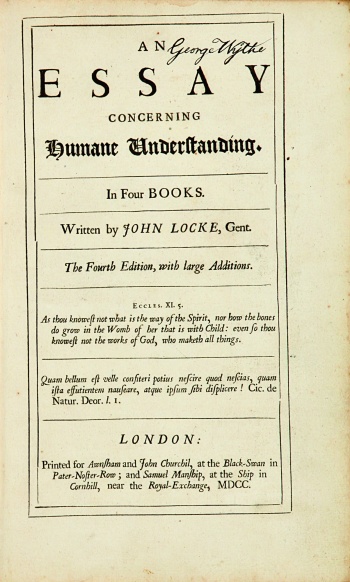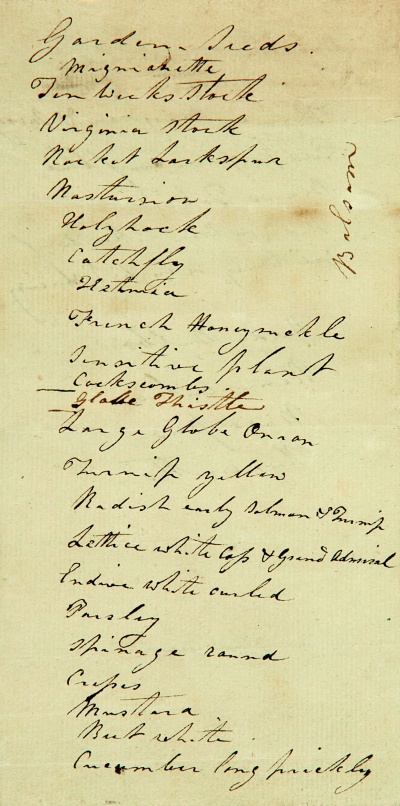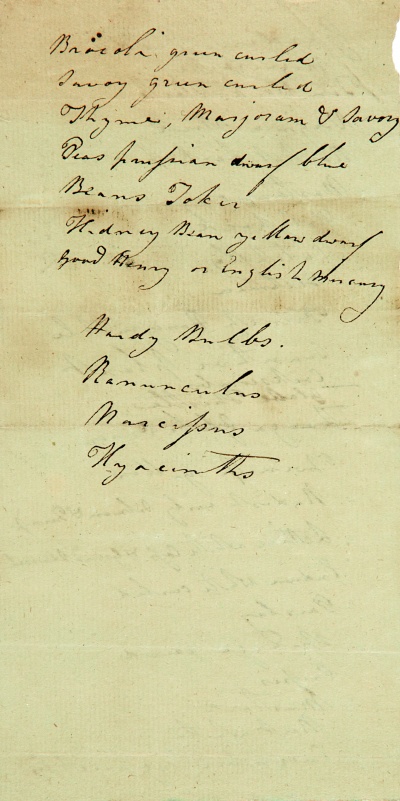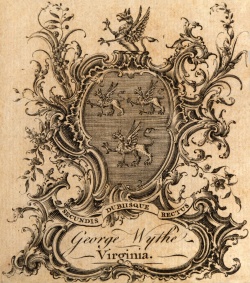Difference between revisions of "Essay Concerning Humane Understanding"
(→Evidence for Inclusion in Wythe's Library) |
m (→Evidence for Inclusion in Wythe's Library) |
||
| (9 intermediate revisions by 2 users not shown) | |||
| Line 1: | Line 1: | ||
{{DISPLAYTITLE:''An Essay Concerning Humane Understanding''}} | {{DISPLAYTITLE:''An Essay Concerning Humane Understanding''}} | ||
===by John Locke=== | ===by John Locke=== | ||
| − | |||
{{NoBookInfoBox | {{NoBookInfoBox | ||
|shorttitle=An Essay Concerning Humane Understanding | |shorttitle=An Essay Concerning Humane Understanding | ||
|commontitle= | |commontitle= | ||
|vol= | |vol= | ||
| − | |author=John Locke | + | |author=[[:Category:John Locke|John Locke]] |
|editor= | |editor= | ||
|trans= | |trans= | ||
| − | |publoc=London | + | |publoc=[[:Category:London|London]] |
|publisher=Printed for Awnsham and John Churchil ... and Samuel Manship | |publisher=Printed for Awnsham and John Churchil ... and Samuel Manship | ||
|year=1700 | |year=1700 | ||
|edition=Fourth | |edition=Fourth | ||
| − | |lang=English | + | |lang=[[:Category:English|English]] |
|set= | |set= | ||
| − | |pages=[38], 438 (i. e. 432), [12] | + | |pages=[38], 438 (i. e. 432), [12] |
| − | |desc=Folio (33 cm.) | + | |desc=[[:Category:Folios|Folio]] (33 cm.) |
| − | }} | + | }}Born into a family of means but minor status in Wrighton, Somerset, [[wikipedia:John Locke|John Locke]] (1632–1704) would become a philosopher and political theorist whose works would influence and shape the Enlightenment in Europe. |
| − | Born into a family of means but minor status in Wrighton, Somerset, [[wikipedia:John Locke|John Locke]] (1632–1704) would become a philosopher and political theorist whose works would influence and shape the Enlightenment in Europe. | ||
| − | Locke's father was a country attorney and a steward to a powerful local family who sponsored the younger Locke's early education, beginning in 1647 in London. In 1652, Locke moved on to university at [wikipedia:Christ Church, Oxford|], studying alongside the likes of [[wikipedia:John Dryden|John Dryden]], [[wikipedia:Robert Hooke|Robert Hooke]], and [[wikipedia:Christopher Wren|Christopher Wren]]. Locke took both a Bachelors and Masters of Arts, in 1656 and 1658. | + | Locke's father was a country attorney and a steward to a powerful local family who sponsored the younger Locke's early education, beginning in 1647 in London. In 1652, Locke moved on to university at [[wikipedia:Christ Church, Oxford|Christ Church]], studying alongside the likes of [[wikipedia:John Dryden|John Dryden]], [[wikipedia:Robert Hooke|Robert Hooke]], and [[wikipedia:Christopher Wren|Christopher Wren]]. Locke took both a Bachelors and Masters of Arts, in 1656 and 1658. |
[[File:LockeEssayConcerningHumaneUnderstanding1700TitlePage.jpg|left|thumb|350px|Title page from [[George Wythe|George Wythe's]] personal copy of ''An Essay Concerning Humane Understanding'' (London: Printed for Awnsham and John Churchil ... and Samuel Manship, 1700). Wythe's copy is in a private collection.]] | [[File:LockeEssayConcerningHumaneUnderstanding1700TitlePage.jpg|left|thumb|350px|Title page from [[George Wythe|George Wythe's]] personal copy of ''An Essay Concerning Humane Understanding'' (London: Printed for Awnsham and John Churchil ... and Samuel Manship, 1700). Wythe's copy is in a private collection.]] | ||
In 1666 Locke met and befriended [[wikipedia:Anthony Ashley Cooper, 1st Earl of Shaftesbury|Anthony Ashley Cooper]], the first Earl of Shaftesbury. In 1675, Locke took a Bachelor's of medicine at Christ Church, allowing him to occupy a medical studentship at the college. Shaftesbury appointed Locke as his personal physician, and remained Locke's patron for more than two decades. In 1679, when Shaftesbury's bid to bar the Catholic duke of York (later, [[wikipedia:James II of England|King James II]]) from the royal succession failed, the two went into exile in the Netherlands, returning in 1688 when [[wikipedia:William III of England|William III]], a Protestant, was placed on the throne.<ref>J. R. Milton, [http://www.oxforddnb.com/view/article/16885 "Locke, John (1632–1704),"] in ''Oxford Dictionary of National Biography,'' accessed 30 April 2015.</ref> | In 1666 Locke met and befriended [[wikipedia:Anthony Ashley Cooper, 1st Earl of Shaftesbury|Anthony Ashley Cooper]], the first Earl of Shaftesbury. In 1675, Locke took a Bachelor's of medicine at Christ Church, allowing him to occupy a medical studentship at the college. Shaftesbury appointed Locke as his personal physician, and remained Locke's patron for more than two decades. In 1679, when Shaftesbury's bid to bar the Catholic duke of York (later, [[wikipedia:James II of England|King James II]]) from the royal succession failed, the two went into exile in the Netherlands, returning in 1688 when [[wikipedia:William III of England|William III]], a Protestant, was placed on the throne.<ref>J. R. Milton, [http://www.oxforddnb.com/view/article/16885 "Locke, John (1632–1704),"] in ''Oxford Dictionary of National Biography,'' accessed 30 April 2015.</ref> | ||
| − | Locke's most significant works were published after his return to England. In | + | Locke's most significant works were published after his return to England. In 1689, he published his ''[[wikipedia:An Essay Concerning Human Understanding|Essay Concerning Human Understanding]]'' (dated 1690), which he had begun while in exile. Locke's ''Essay'' was born of a lively conversation with a number of associates and friends, after which he wrote some "hasty and undigested thoughts" on the ultimate subject of the work. Dedicated to [[wikipedia:Thomas Herbert, 8th Earl of Pembroke|Thomas Herbert]], the Earl of Pembroke, the ''Essay'' explores "the discerning faculties of man" with respect to the world around him. Locke considers the human mind to be a "blank slate" at birth, and advocates an exploration of the world in such a manner where sensation and perception dictate which attributes the explorer attributes to the object. In other words, Locke's work discouraged the attribution of innate, but imperceptible, qualities to objects, instead advocating attributing only perceptible qualities to items. The heart of his argument is that observers should not project human experience upon an object, instead resting solely on what was observable. Locke's essay serves as a guide regarding proper methods of thought regarding the observable world, and as a criticism of a rival theology.<ref>Olivia Smith, "Thinking Through Things in Texts: A Seventeenth-Century Example," ''Paragraph,'' 37, no. 1 (1998), 112-25.</ref> |
| − | |||
| − | |||
| − | |||
| − | |||
[[File:LockeEssayConcerningHumaneUnderstanding1700Signature.jpg|right|thumb|500px|[[George Wythe|Wythe's]] signature from the title page of his personal copy of ''An Essay Concerning Humane Understanding.'' Wythe's copy is in a private collection.]] | [[File:LockeEssayConcerningHumaneUnderstanding1700Signature.jpg|right|thumb|500px|[[George Wythe|Wythe's]] signature from the title page of his personal copy of ''An Essay Concerning Humane Understanding.'' Wythe's copy is in a private collection.]] | ||
| − | + | ''An Essay Concerning Humane Understanding'' is widely considered his seminal work for their analysis of human methods of thought and as criticisms of rival doctrines. Written while in exile from England, Locke's essay quickly took hold in a number of intellectual circles around Europe, became a cornerstone of 18th-century British empiricism, and had a lasting impact upon the time's conception of natural philosophy and of the nature of religious doctrine and political power. | |
| − | |||
| − | |||
==Evidence for Inclusion in Wythe's Library== | ==Evidence for Inclusion in Wythe's Library== | ||
| Line 40: | Line 32: | ||
George Wythe's copy of this book has survived, and is currently in a private collection. The title page boasts a clear, bold version of Wythe's signature in the top right corner. | George Wythe's copy of this book has survived, and is currently in a private collection. The title page boasts a clear, bold version of Wythe's signature in the top right corner. | ||
| − | Found inserted between the pages of the book was a list of "Garden Seeds" and "Hardy Bulbs" in Wythe's | + | Found inserted between the pages of the book was a manuscript list of "Garden Seeds" and "Hardy Bulbs," possibly not in Wythe's own hand, but presumably intended for filling his garden with flowering plants, and vegetables and herbs. A cookbook Wythe purchased in 1764, ''[[Art of Cookery|The Art of Cookery]]'', uses many of these products as ingredients: |
{| align="center" | {| align="center" | ||
| Line 159: | Line 151: | ||
==See also== | ==See also== | ||
*''[[Art of Cookery|The Art of Cookery]]'' | *''[[Art of Cookery|The Art of Cookery]]'' | ||
| + | *[[Known Surviving Wythe Volumes]] | ||
*''[[Works of John Locke|The Works of John Locke, Esq.]]'' | *''[[Works of John Locke|The Works of John Locke, Esq.]]'' | ||
*[[Wythe's Library]] | *[[Wythe's Library]] | ||
| Line 166: | Line 159: | ||
==External links== | ==External links== | ||
| − | |||
*Read this book in [https://books.google.com/books?id=JMxZAAAAcAAJ Google Books.] | *Read this book in [https://books.google.com/books?id=JMxZAAAAcAAJ Google Books.] | ||
| + | __NOTOC__ | ||
| + | [[Category:Horticulture]] | ||
| + | [[Category:John Locke]] | ||
[[Category:Known Surviving Wythe Volumes]] | [[Category:Known Surviving Wythe Volumes]] | ||
[[Category:Philosophy]] | [[Category:Philosophy]] | ||
[[Category:Titles in Wythe's Library]] | [[Category:Titles in Wythe's Library]] | ||
| + | |||
| + | [[Category:English]] | ||
| + | [[Category:Folios]] | ||
| + | [[Category:London]] | ||
Latest revision as of 09:04, 18 May 2022
by John Locke
| An Essay Concerning Humane Understanding | ||
|
at the College of William & Mary. |
||
| Author | John Locke | |
| Published | London: Printed for Awnsham and John Churchil ... and Samuel Manship | |
| Date | 1700 | |
| Edition | Fourth | |
| Language | English | |
| Pages | [38], 438 (i. e. 432), [12] | |
| Desc. | Folio (33 cm.) | |
Born into a family of means but minor status in Wrighton, Somerset, John Locke (1632–1704) would become a philosopher and political theorist whose works would influence and shape the Enlightenment in Europe.
Locke's father was a country attorney and a steward to a powerful local family who sponsored the younger Locke's early education, beginning in 1647 in London. In 1652, Locke moved on to university at Christ Church, studying alongside the likes of John Dryden, Robert Hooke, and Christopher Wren. Locke took both a Bachelors and Masters of Arts, in 1656 and 1658.

In 1666 Locke met and befriended Anthony Ashley Cooper, the first Earl of Shaftesbury. In 1675, Locke took a Bachelor's of medicine at Christ Church, allowing him to occupy a medical studentship at the college. Shaftesbury appointed Locke as his personal physician, and remained Locke's patron for more than two decades. In 1679, when Shaftesbury's bid to bar the Catholic duke of York (later, King James II) from the royal succession failed, the two went into exile in the Netherlands, returning in 1688 when William III, a Protestant, was placed on the throne.[1]
Locke's most significant works were published after his return to England. In 1689, he published his Essay Concerning Human Understanding (dated 1690), which he had begun while in exile. Locke's Essay was born of a lively conversation with a number of associates and friends, after which he wrote some "hasty and undigested thoughts" on the ultimate subject of the work. Dedicated to Thomas Herbert, the Earl of Pembroke, the Essay explores "the discerning faculties of man" with respect to the world around him. Locke considers the human mind to be a "blank slate" at birth, and advocates an exploration of the world in such a manner where sensation and perception dictate which attributes the explorer attributes to the object. In other words, Locke's work discouraged the attribution of innate, but imperceptible, qualities to objects, instead advocating attributing only perceptible qualities to items. The heart of his argument is that observers should not project human experience upon an object, instead resting solely on what was observable. Locke's essay serves as a guide regarding proper methods of thought regarding the observable world, and as a criticism of a rival theology.[2]

An Essay Concerning Humane Understanding is widely considered his seminal work for their analysis of human methods of thought and as criticisms of rival doctrines. Written while in exile from England, Locke's essay quickly took hold in a number of intellectual circles around Europe, became a cornerstone of 18th-century British empiricism, and had a lasting impact upon the time's conception of natural philosophy and of the nature of religious doctrine and political power.
Evidence for Inclusion in Wythe's Library
George Wythe's copy of this book has survived, and is currently in a private collection. The title page boasts a clear, bold version of Wythe's signature in the top right corner.
Found inserted between the pages of the book was a manuscript list of "Garden Seeds" and "Hardy Bulbs," possibly not in Wythe's own hand, but presumably intended for filling his garden with flowering plants, and vegetables and herbs. A cookbook Wythe purchased in 1764, The Art of Cookery, uses many of these products as ingredients:
|
 A list of seeds and bulbs (front) found in George Wythe's personal copy of An Essay Concerning Humane Understanding. Wythe's copy is in a private collection. |
|
 A list of seeds and bulbs (back) found in George Wythe's personal copy of An Essay Concerning Humane Understanding. Wythe's copy is in a private collection. |
See also
References
- ↑ J. R. Milton, "Locke, John (1632–1704)," in Oxford Dictionary of National Biography, accessed 30 April 2015.
- ↑ Olivia Smith, "Thinking Through Things in Texts: A Seventeenth-Century Example," Paragraph, 37, no. 1 (1998), 112-25.
External links
- Read this book in Google Books.
